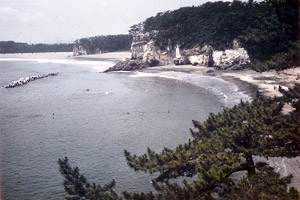I serve on the Asian Access Board of Directors and recently had the opportunity to visit Japan and go to the area devastated by the earthquake and tsunami earlier this year.
During the trip, it was extraordinarily moving to recall my initial three months in Japan in 1973 (pictured below). These memories include being a summer worker with the Language Institute for Evangelism (later LIFE Ministries, later Asian Access); my experiences as a commuter on the Tokyo trains; speaking at the Tyrannus Hall in Higashifushimi and at Christian Academy of Japan in Higashikurume; serving as a church growth researcher; and vacationing with other missionary families in Takayama at the very section of coast recently devastated by the tsunami.
This time, worshiping with Japanese believers; working to stir up my recall of kanji and hiragana writing; sampling miso soup, nori and inari sushi; and marveling at the Japanese maples in fall splendor, are just a few of the experiences that awakened decades of memories of visits to Japan.

I remember stopping in Hawaii on the way back from Japan 38 years ago, asking the Lord if he wanted me to return as a missionary. To my surprise, the Lord seemed to say clearly to my heart, “No, I do not want to use you as a worker in one nation, but to use you in many nations.” Nearly four decades later, having traveled as a Bible teacher and researcher to over 40 countries, and now serving as part of the leadership team of The Lausanne Movement, I have a better sense of what the Lord was intending. But still there is a deep tug on my heart whenever I return to Japan.
Three words dominate my impressions of this recent week: incarnation, partnership, hope.
During this Advent season we recall the miracle that “The Word became flesh and made his dwelling [literally, pitched his tent] among us. We have seen his glory, the glory of the One and Only, who came from the Father, full of grace and truth.”
The incarnation was the process. The revelation of God’s glory was the result.
That’s what I saw illustrated again and again in the responses of Asian Access staff, other North American workers, and numerous Japanese believers to the triple disaster of 11th March 2011. I recall the old saying, “A friend is one who comes in when the whole world has gone out.” The church of Jesus Christ has been a friend to the people of the Tohoku region. I heard numerous examples of Christian volunteers, both Japanese and foreigners, making frequent trips into the devastated areas, not only delivering supplies and assisting with clean-up, but taking time to listen to people’s hearts, drawing out the stories of grief and loss, weeping with those who wept, befriending those who felt alone.
The most vivid illustration for me was meeting two American families who were moving, with their children, into neighborhoods where many of the homes had been swept off their foundations by the tsunami. Thus they were becoming part of rebuilding the communities and preparing to share the long road toward a shalom more far-reaching, more integral and more multi-dimensional than any of their neighbors could presently imagine. “O come to us, abide with us, our Lord Emmanuel.” God with us. Incarnation. The whole gospel.
Asian Access has long been known for its determination to work in partnership with the whole Body of Christ, forming multi-denominational church-planting networks and conducting leadership development with cohorts of pastors from various traditions. In country after country Asian Access has been a catalyst for unity and collaboration in evangelism, discipleship and establishment of worshiping communities. But this passion for partnership was especially evident among all of the leaders we encountered. Wherever we visited, we heard stories of cooperation with agencies like Samaritan’s Purse and Churches Helping Churches. We saw Pentecostals and Conservative Baptists working together and affirming one another—something one could hardly have imagined even twenty years ago in Japan. We encountered many cases of younger leaders and older leaders sharing the burden together.
In times of crisis the people of God cannot afford to be divided. In a country where less than one percent of the people profess any sort of allegiance to Christ, a united witness is more important than ever. What joy to see Jesus-followers functioning in the disaster areas more and more as “one body.” The whole church taking the whole gospel. Partnership embodied.
The clean-up in the tsunami area had progressed far more than I would have imagined after less than nine months. The lingering grief was not far below the surface, but the rebuilding of communities, and of personal lives, was underway. And there were many expressions of hope. The region of Japan once known as the most traditional, the most closed and the most resistant to the gospel has now become the most open. Veteran Christian workers, both Japanese and foreigners, expressed marvel at the openness of people to prayer, to reading of the Scripture, to genuine expressions of Christ-like love and to spiritual conversations about the ultimate meaning and purpose in life.
Japanese people are coming to Christ, both young people and adults. Many are now openly seeking. New forms of church structure and fresh experiments in outreach are bearing fruit. There is a spirit of energy and enthusiasm and new possibilities, especially among younger leaders, and a passion to take the good news of Jesus not only into the northeast region of Japan, but to accelerate the sending of workers from Japan to other parts of Asia and the world. New wineskins. A spirit of optimism. A fresh awakening of hope.
The whole church taking the whole gospel to the whole world.
May God bless you afresh this Advent season as you live out the incarnation of God with us, as you intentionally seek to work together in the partnership of the gospel and as you share with those around you who are desperately in need hope.

